Welp, guess I better review the heavyweight.
Attack on Titan arrived at the head of quite the hype train this spring, based on both praise from manga readers and this impressive PV. Its OP inspired countless parodies, its sales were enormous, its cultural penetration extended far beyond the reach most anime could dream of. With good reason – most anime essentially self-marginalize themselves through overt anime-ism aesthetic choices that cut off significant potential markets. Titan does not do this – it’s an unapologetic action blockbuster with an evocative western aesthetic and a fundamentally compelling premise. Humans live in a massive renaissance-era walled city, titans try to break in, humans fight using sweet spiderman-esque maneuvering gear, action ensues. Let’s start with those strengths.
First, the setting and aesthetic are solid. The mangaka is clearly a worldbuilding geek in the best way – the rules of the world are laid out in practical and confident fashion (I particularly liked the little details they fit into each mid-episode break), making it enjoyable to see the scope of the story expand to reveal details of titan-world life one episode at a time. The visual aesthetic is also distinctive and strong in a variety of ways. The character design is most prominent here – the use of thick, prominent black lines for profiles and outlines makes the characters pop in a very effective way, and the variety of facial structures is a welcome relief in light of anime’s usual sameface issues, making for a much greater degree of varying expressiveness throughout the cast. After the character design comes the city design, which is arresting both at peace and at war. The architecture tends to repeat itself across larger city shots, but on an individual level the designs are quite solid, and manage to feel “lived in” in a way that really helps sell the “we must defend our homes” tenor of the early episodes. Finally, the titan designs themselves are clear standouts – their grotesque menagerie of facial and structural designs, as well as the bizarre way the various aberrant titans move, makes for unnerving (and admittedly sometimes hilarious) monsters. The dopey ghoulishness of the creatures somehow makes the horrors of the story hit that much harder.
Second, as I said, the premise is a great setup for what this show is trying to do. Normally I don’t really focus on premise or plot in reviews (“plot is details,” etc), but this is certainly an intelligent mixture of variables. It’s essentially the “bunker down” segment of most zombie movies, except imagined as an entire fraught society. I feel the show could have done better to establish the feel of being caged animals (Eren mainly just tells us this, which isn’t good storytelling), but the setup is definitely evocative, and leads naturally into the ways this show draws on war film tropes and beats. Which all pulls together in the show’s premier feature…
The action setpieces. I have a number of issues with Titan’s director, but the man certainly knows how to frame an action scene. Sequences like the one that ends the PV crop up like delicious candy once or twice every few episodes, becoming more frequent in the show’s far superior second half. They’re fun, they’re visceral, they’re basically pure popcorn. And the show’s blockbuster status is also most apparent here – many episodes feature fairly limited animation, but when it comes to these moments, the show splurges in the best possibly way. If spinning badasses and blood are what you’re here for, you won’t be disappointed.
That said, Titan also has a number of frustrating issues that definitely hamper the experience. The first of these to appear is likely the most controversial – the direction. Though the action scenes are generally solid (if somewhat weightless, which is probably intentional), the dramatic scenes fair far less well – and the reasons why can pretty much be summed up by everyone’s favorite moment from Death Note, also a product of this director. The show has a very tenuous grasp on the idea of subtlety, and many of its emotional turns are played at full volume, complete with manic expressions, blaring music, speed lines, and “epic” camera angles. This pretty much as a rule goes beyond a standard emotional sell and into the realm of melodrama – that is, the investment the show builds up naturally in the viewer does not correlate to the extreme level of intensity the direction and acting affect.
This problem is exemplified in the first episode, when a returning soldier is asked by a passing woman about the fate of her son. Instead of answering her, the soldier motions to his companion, saying “it’s her, Moses’ mother. Bring it here.” The soldier rummages for something in his cart, slowly brings it over, hands it to the mother. The mother looks at the bloody, obscured object, looks up at the soldier. Looks down. Begins unwrapping it. It’s a hand! “That’s all we could save.” She breaks down, and then slowly asks if he was at least useful – leading to this questionable moment where the soldier epically declares that her son died for nothing as the camera shakes and speed lines drive in the tremendousness of the moment. It doesn’t convey grief. It doesn’t convey horror. It pretty much only conveys “intensity.”
The show just doesn’t follow the rules of dramatic immersion. It plays tragic scenes as epic, it plays cathartic scenes as epic, it plays… well, you get the picture. This problem actually comes up less often as the series progresses, but it’s tremendously immersion-breaking whenever it does, and seems to speak to an unwillingness to let the show’s drama speak for itself, without tricks designed to sell you on it. It could also be a result of too-faithful adherence to the manga – whereas a dramatic pose in a manga panel can easily be swept by in a moment, when that pose is held for the full seconds of a spoken line, it can easily verge into self-parody. Either way, it deals tremendous damage to the show’s weight as a horror piece – and though the show is primarily action, that action is routinely and expressly underpinned by a sought-for sense of horror and anxiety, particularly in the first establishing episodes where this problem is so prevalent. When building dramatic tension or expressing serious emotions, less is almost always more – and this director strongly disagrees, to the detriment of the show overall.
The second issue with Titan is the most readily apparent, and one even those who enjoy the show (myself included) generally accept as a given – the pacing. Early on, the show moves quickly, establishing the premise through a series of dramatic scenes and then filling out the cast through a well-handled training arc that makes great use of the show’s war film roots. This leads directly into the Trost arc, which starts off with the strong mixture of horror and action that exemplifies the show at its best, and then… slows down. Tremendously so. Single, simple conversations and problems (We need to convince him not to shoot us! Eren needs to wake up!) stretch to fill entire episodes, and simple emotional turns become tremendous screen-time impasses. The stretch of episodes from 9 to 13 encompass enough content for perhaps three well-paced episodes, with scenes themselves not only stretching, but actual conflicts (such as Eren being woken up by Armin, a conflict already lacking in tangible weight – that is, the conflict is not a series of definable variables the audience can follow, it is simply waiting for the narrative to allow Eren to wake up) repeating in separate circumstances. The show never again goes through a stretch as dramatically debilitating as that, but problems of pacing do crop up throughout, and the show overall feels like a lean 20 episodes bloated to 25. The slow pans and dramatic builds that fill out this episode count also strongly contribute to the issues of direction and dramatic tension, resulting in a less-gripping show overall. And this flaw couldn’t be more damaging than in such a committed action show.
Finally, the last major issue I’d take with the show is its writing. The larger beats of the story work well (though the choice to “kill” and revive Eren certainly lowers dramatic tension from there on), but on the individual level, both the show’s characters and thematics are fairly threadbare. Admittedly, this might not be the most reasonable complaint to level at an action show, but it certainly hurts immersion. Eren in particular is a big, glaring shounen hero stuck in a world that’s simply more complex and interesting than his level of character writing should really be applied to. The Titans killed people he cares about, and he wants to go outside the walls, so he will kill them all. He does not work well with others. He’s largely driven by emotion. That pretty much covers it – though the show later makes him compromise by trusting in his squadmates (which is its own whole can of worms, actually – the show tries to make a thematic conflict out of soldiers coming to grips with following orders, which struck me as just inherently ludicrous), this ultimately doesn’t actually result in growth for him. He remains the classic headstrong protagonist to the last.
Fortunately, some of the side characters fare much better, though their growth only really begins to take form in the show’s last, best act. Jean and Armin in particular both run through a sharp series of formative character turns, and their perspective and maturity at the end compared to the start is extremely satisfying to see. Additionally, though the side characters beyond these two are all fairly static, many are also just fundamentally entertaining – the scouting corps personalities introduced in the second half (again, I can’t stress enough how much this show improves in its second half) are all both distinctive and great drivers of the plot.
As far as the show’s thematics go, the show takes a great deal of time trying to decide what it’s actually about. Early on, Mikasa’s backstory hints at the concept of killing simply being a fact of nature – survival of the fittest as moral directive. This crops up lightly throughout, and is associated fairly strongly with eating as a visual motif, but isn’t really explored beyond that. Shortly after that, the charismatic Captain Pixis plays off the natural fear of the masses to lead a counterassault against the Titans. Throughout this and the second half, the complacency of those not immediately affected by the Titans is regularly brought up, though never really discussed. Finally, in the show’s last quarter, it begins to seriously focus on one solid thread – the idea of the “greater good,” and the horrors required of soldiers for the sake of victory.
This is definitely a solid theme, but the show’s handling of it is mixed at best. On the good side, Armin’s gradual understanding of the grim calculations of war is one of the last act’s best strengths – it’s portrayed as a series of dawning calculations across a number of relevant episodes, and is strongly tied to his overall character growth. This perspective is mirrored by characters like Commander Erwin, who pretty much serves as a powerful one-man articulation of the burden of leadership. On the negative side, the show also indulges in moments that significantly undercut the seriousness of this idea. Eren is one of the worst offenders here – in addition to his almost disobeying orders simply because he didn’t like them (an absurd conflict the show actually stretches out across a full episode), he also later expresses tremendous hesitation when ordered to attack a former friend who is… currently killing hundreds of people in titan form. The show plays these moments as legitimate conflicts, but the level of simplistic sentimentality required to even see Eren’s position as an argument just left me in awe as a viewer. And this childlike sentimentality extends to other moments, such as when soldiers express misgivings about leaving behind dead bodies… in order to not have all the living soldiers get eaten by titans. Where is the conflict in that? Though the show regularly pulls on war story tropes, its juvenile approach to this thematic thread makes a number of points difficult to take seriously as drama. Hopefully the show’s further seasons will push this thread in a more believable direction, but it currently reads as a question completely out of sync with the brink-of-extinction world the characters inhabit.
Hm. That’s a lot of negative to go out on, but I feel that’s mainly because the show’s strengths are just self-evident, and don’t need to be sold. It has a solid premise. It has an interesting world, and a strong visual aesthetic to complement it. The action scenes are impressive, both in their direction and animation. Though the show has a number of problems that I think definitely weaken it, it still succeeds in its prime goal – providing entertaining popcorn. Outside of perhaps the direction, none of Titan’s problems are fundamental – and going forward, I’m hopeful the second season will be able to address my complaints of pacing and thematics, problems which were already beginning to be addressed in this first season’s second half. Overall, though I wouldn’t unabashedly recommend it due to the combination of these issues and its somewhat limited ambitions, I’d consider it generally a success as an action piece. In the absence of those problems, I’d rate it about as high as pure action shows go on my scale – an 8/10, the same score I assigned to Baccano and Code Geass. Given those issues, I’m rating it a 6/10 (Solid), and am looking forward to seeing it continue to improve in the second season. Either way, if you’re looking for a nicely realized world and some lovingly animated action sequences, it’s definitely a solid pick.

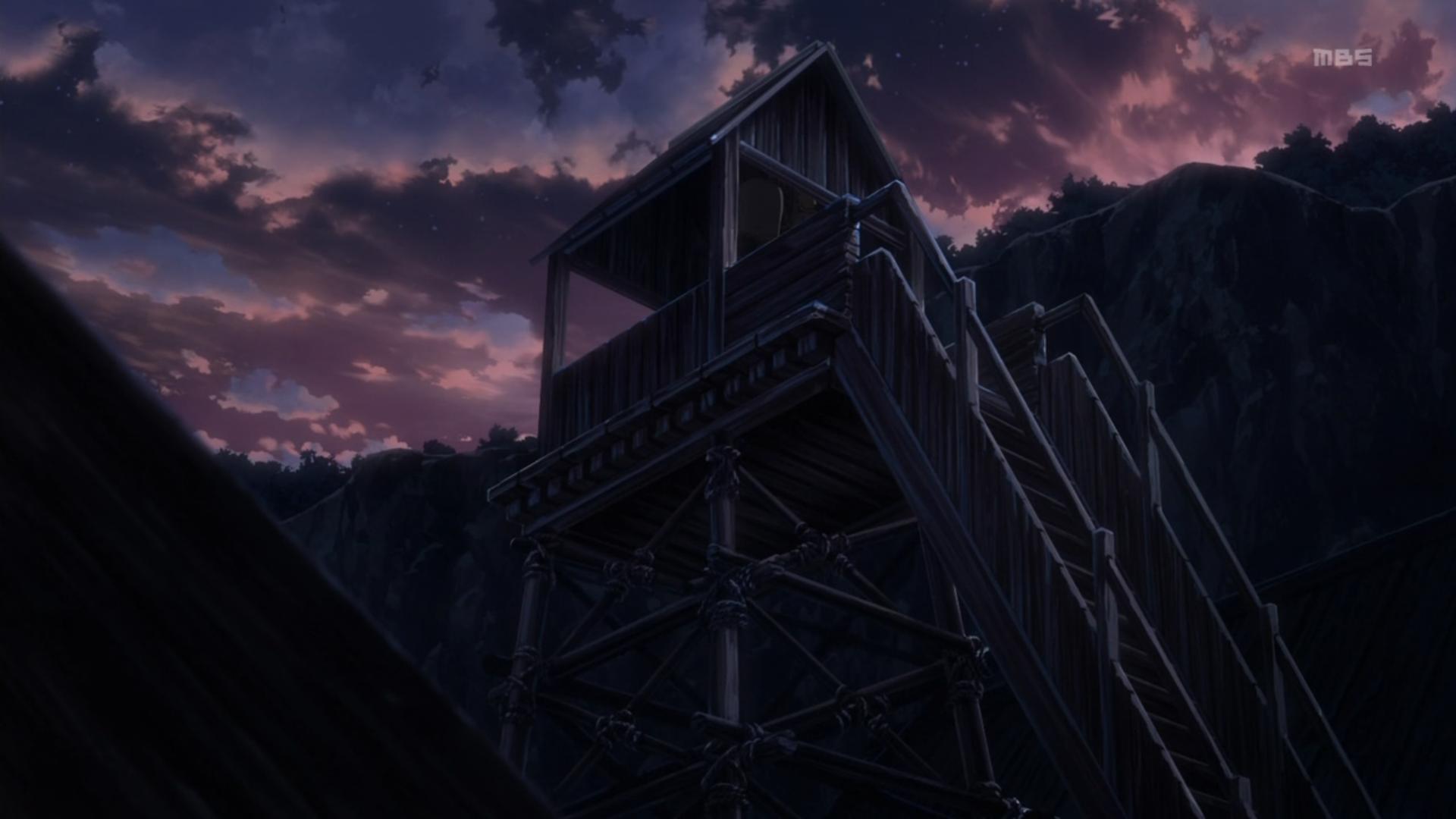
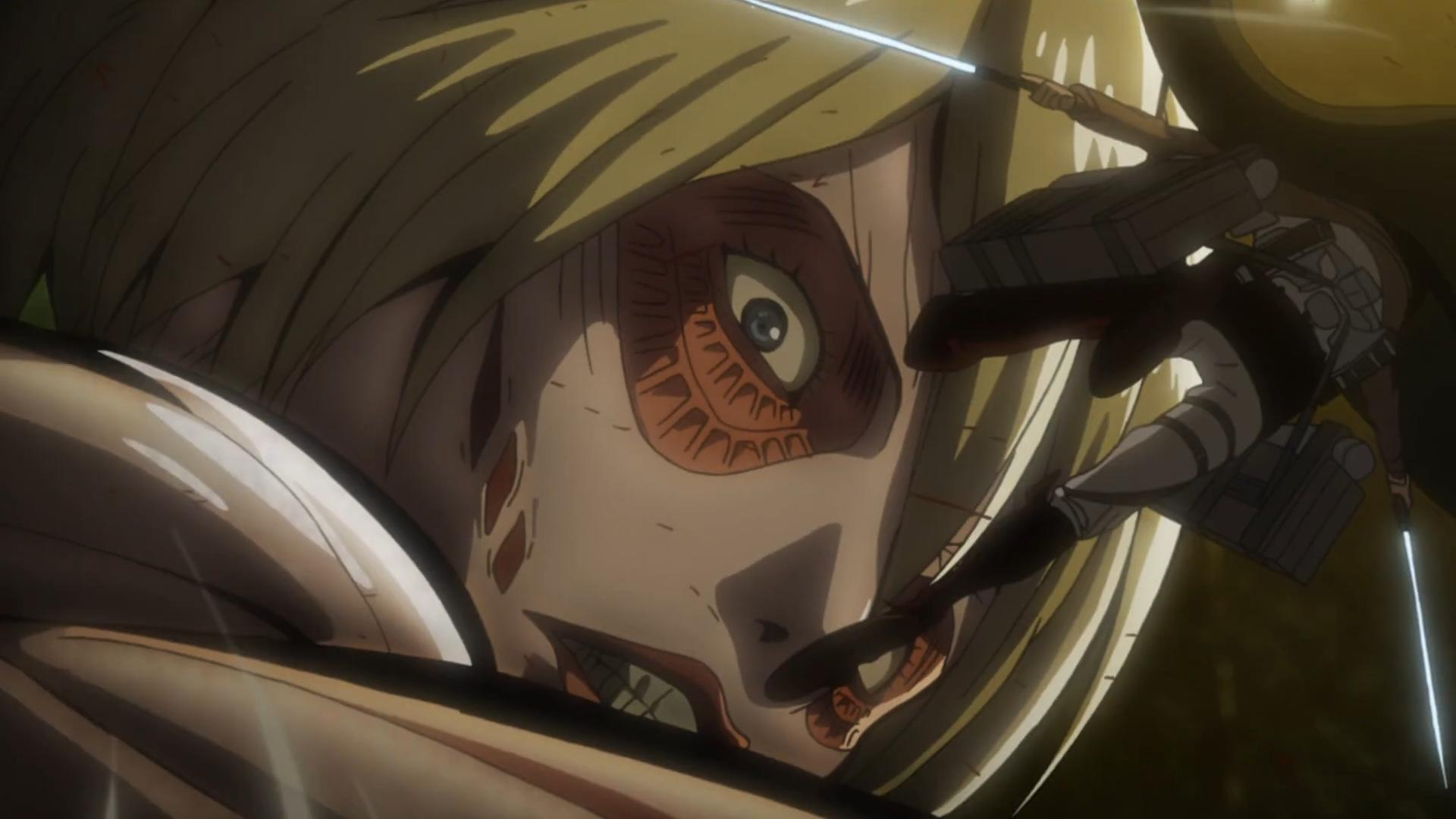
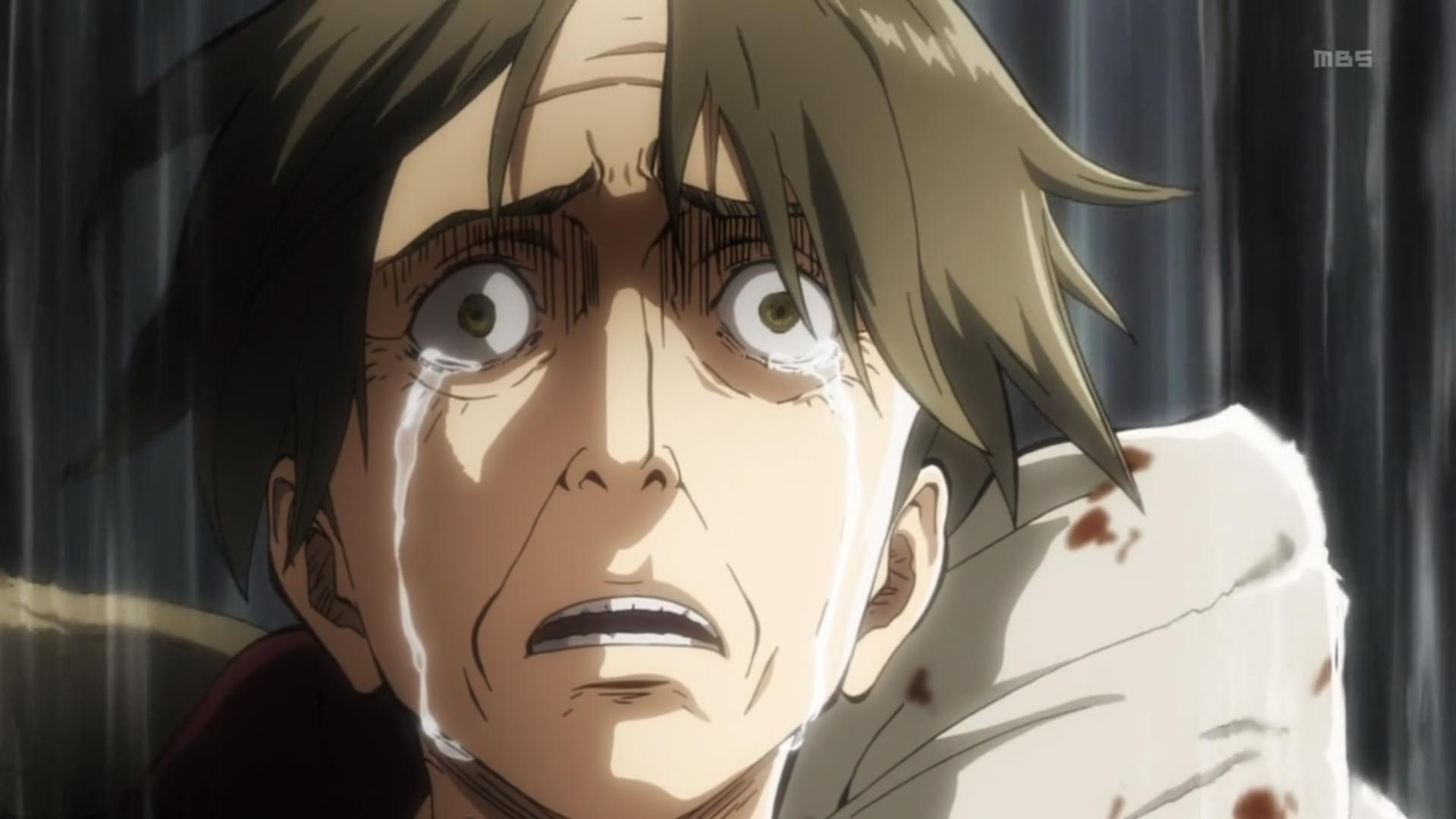
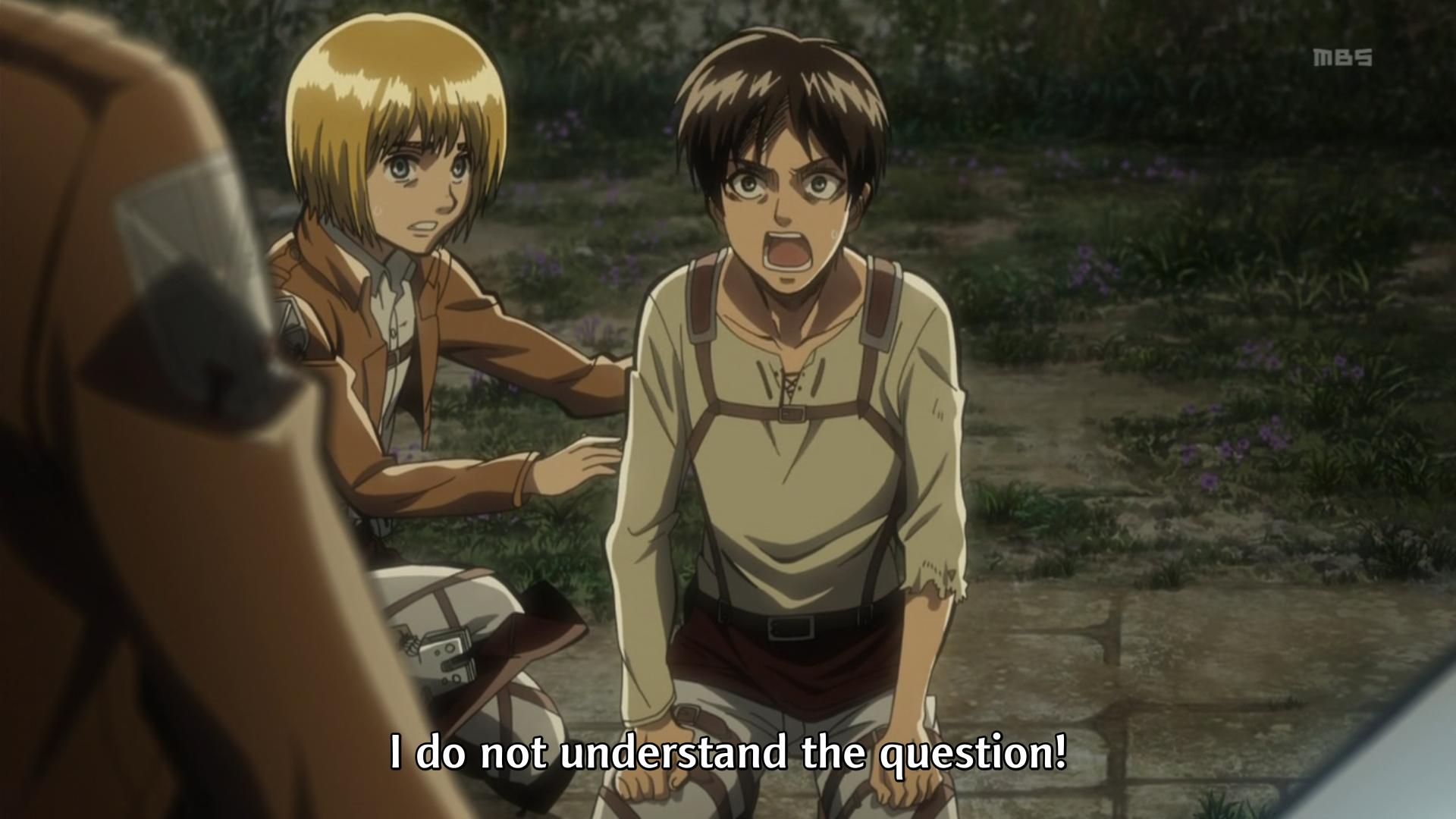
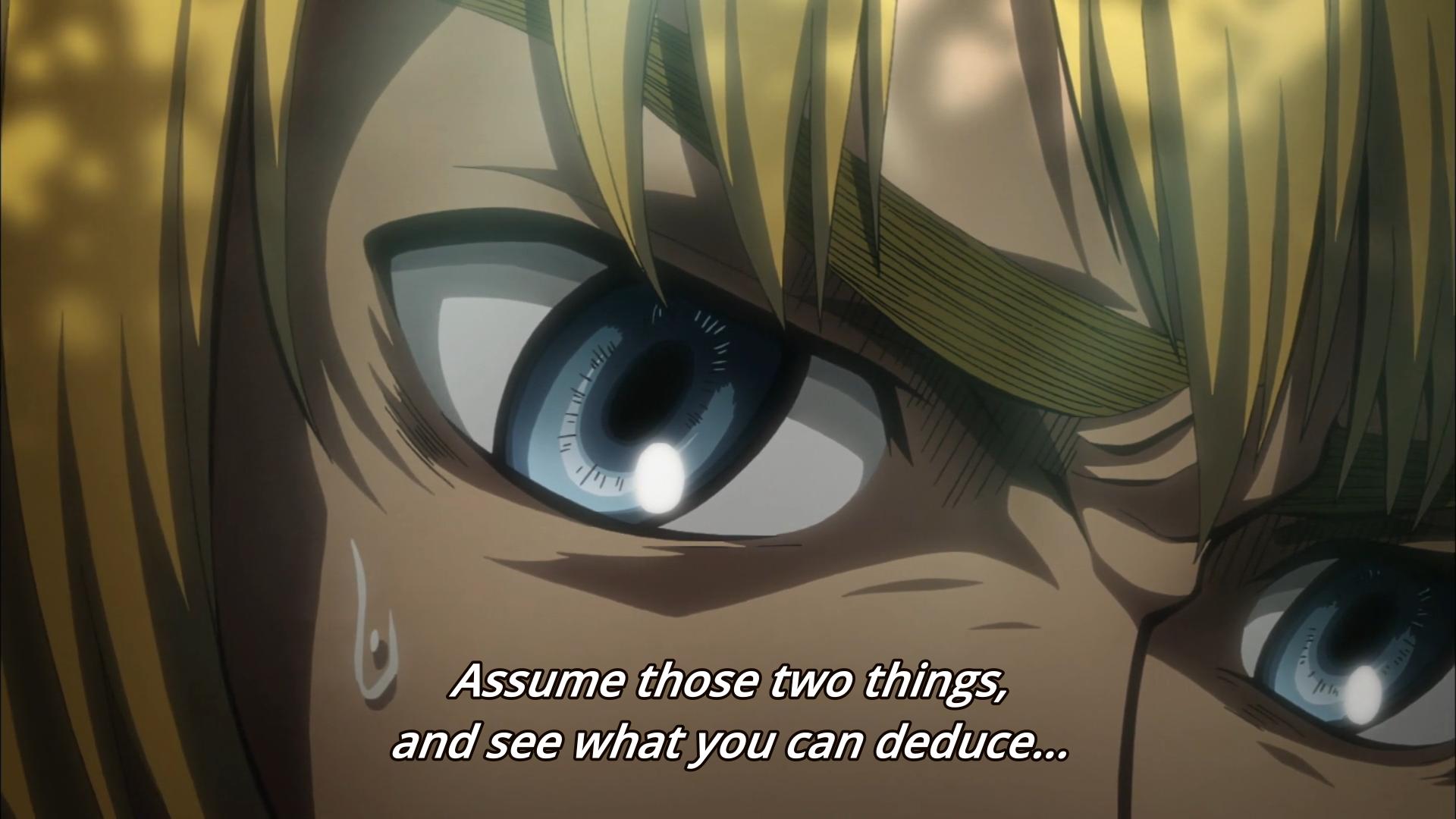
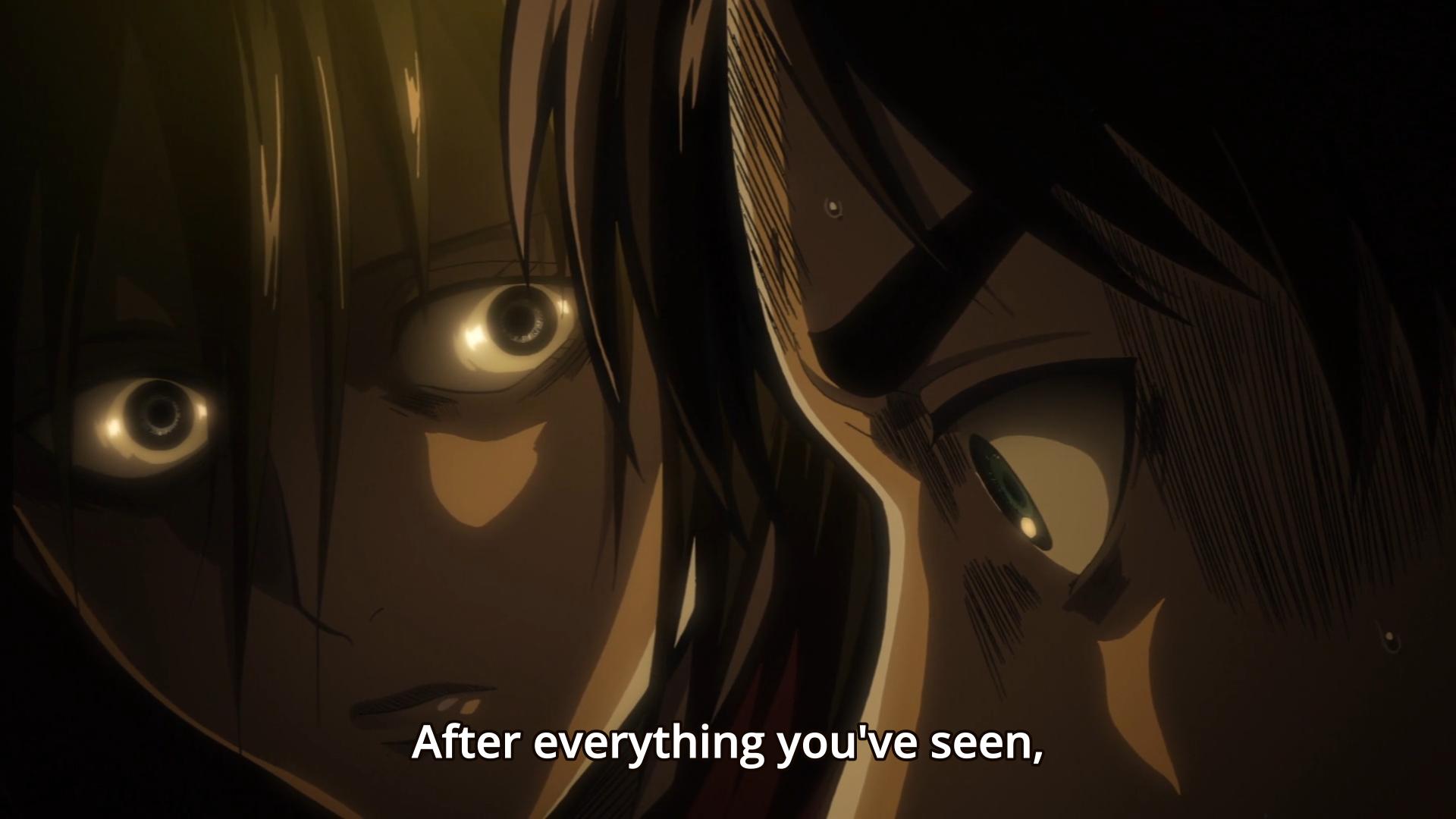
My biggest two issues with this show were likewise the pacing (which admittedly got a lot better during its second half) and the intense epicness that accompanied nearly everything – the latter of which seemed to result in all the characters literally screaming 90% of their lines instead of just saying them. Less problematic but still annoyingly, the scripting itself seemed oddly stilted at times – it felt a little like whoever was in charge of the writing forgot that you can’t just take all the lines from a manga and expect a conversation to flow smoothly when it’s transferred straight onto screen. And finally (for the most part a minor gripe), all those still frames used primarily in the first half of the series felt really awkward.
Other than that, as you said, a solid show that I’ll also almost certainly be continuing to watch when the second season airs. Its positive aspects speak for themselves.
Good call on the scripting. Now that I think about it, it did feel like the characters were sometimes speaking past each other, which could definitely be a result of the greater give and take required for an anime conversation versus a manga one.
I felt this really strong nagging feeling of disappointment the entirety of the way through Titan starting a couple episodes into the Trost arc, but have had a significant amount of trouble putting it into words beyond “the pacing is off” or “it’s not subtle.” You do a great job here breaking down a number of the finer details of these complaints, and you hit on most of the issues that most bothered me about the show.
Like you, I did enjoy the experience overall, however much those glaring flaws may have hampered it (I gave it a 6/10 as well), so what I appreciate most here is your fairness in your analysis of the show. A lot of Titan’s biggest weaknesses (outside of Eren) seem to be misapplications of its biggest strengths (which are also numerous) to contexts to which they don’t apply, so illustrating instances where these parts of the show both do and don’t work nicely demonstrates the confusion that it had about what it was trying to do with them (and with itself).
Great job with the review; looking forward to that second season as well!
Glad you could work in the Eotena in the 90s video, too. Truly a masterpiece of our time.
Glad you enjoyed the review! Titan was certainly a very pointed mix of strengths and weaknesses, which I guess makes it kinda reflective of the director himself. But if it keeps giving us works as beautiful as Eotena in the 90s, how can we possibly complain?
Pingback: Why Do Critics Hate Popular Shows? | Wrong Every Time
Pingback: Top Twelve Anime of 2013 | Wrong Every Time
Pingback: Why Critics Are Always Wrong | Wrong Every Time
you mentioned you and a review on baccano… I would lovely read that but there ain’t one, or did I overlook something?
Nope, don’t have a review on Baccano, unfortunately. I watched that a few years before I started writing criticism.
I mostly agree with your review, except on the point of “following orders” as a conflict point. From the perspective of a group of soldiers being chased down by a man-eating intelligent titan, there is a degree of fear that builds gradually. Eventually, soldiers might convince themselves that they must either fight or die. For a rookie, this effect would understandably be more pronounced, especially if they have the tools to fight. If an order begins to sound more and more like an order to die, then no doubt one would have some subconcious resistance against the idea, since I’d wager that no one wants to die.
That being said, the scene was a bit exaggerated, but not outright preposterous. The effective usage of the premise came from killing off the entire squad after Eren chooses to believe in his squadmates, assuming they would live, which is then enhanced by the brutal deathes they undergo.
In Eren’s mind, these people whom he has bonded with, and we have begun to care about as an audience, have been killed because he chose to believe in someone else’s power rather than his own. He is trapped in a state of “could’ve, should’ve, would’ve” as a result, unable to accept that the choice he thought was so noble only moments before has turned out horribly. At that point, the only thing he can find to blame is himself, since the idea of the situation having been out of his control from the very beginning is mind-bending and emotionally crippling.
The dead bodies conflict never occured the manga, so I’m saddened that that addition has tainted your experience with the series.
Also, his hesitation to fight Annie is GREATLY exaggerated in the anime (which again, saddens me). He takes three pages in the manga for Mikasa to tell him “Sucks to suck” and then transforms without getting trapped under the rubble :/
Which brings me to a larger point about your reviews that I want to mention. I personally believe that not only should the story build its characters but its characters should build the story. Shingeki no Kyojin is more favoring of the latter, where decent characters help construct a intriguing, cohesive story that reveals dark and difficult themes. When I read your reviews, I see that you value character dynamics far more than a smart and mobile story, which is fine because they are indicative of strong writing, but also somewhat limited in scope. I won’t go into depth about how action directing, musical score, and clear art styles are vital components regarding the quality of an anime, but I do think that building great characters and then failing to build a story out of them is just as much of an injustice as having a great story with terrible characters (which the former is my major complaint with Evagellion and Cowboy Bebop, but that’s another essay altogether).
I definitely value a smart, well-told story – but yeah, I think characters are the gateway to meaningful drama, and I don’t tend to find overt narrative events compelling entirely for their own sake. And I certainly value the other elements that go into a cohesive and resonant production – I just focus on them less in my final essays because I personally find those things less interesting to talk about. Hell, when I do end up focusing on elements of visual craft, it’s generally because the show failed to give me something I find really compelling to explore. Though I often talk about various elements of craft in my episodic posts, when it comes to post-show reflections, I’d much rather elaborate on my engagement with a show’s themes than break down how its formal elements succeeded or failed.
There is another way of looking at Titan’s main characters: Eren, Mikasa and Armin are a triad. They represent the three things that make up a human: mind, soul and body. Armin is the
Mind, Mikasa is the body and Eren is the soul. They function
perfectly when they’re together, but take one of them away and
the other two can’t function properly. Hannes even says this in one episode. So while I agree, Eren’s personality involves the typical shounen hero traits magnified a billion times, if you look at him in the context of the triad, you understand why he’s so emotional. Armin reminds me a little of Light from Death Note: for him logic trumps morals; for Mikasa who has lost two families in such a short period of time, survival trumps morals. But for Eren, his moral code comes first. But then, a question arises: if morals are so vital to Eren, then why did he kill two men so brutally, at such a young age? Because for him, those men were no longer human. In both the anime and the manga, he says he killed two animals. The same thing applies to all of his battles: titans are evil, humans are good and he will NOT let anything destroy that which is good. I agree, Eren is a very simple character, but he is an understandable one. Plus, Eren kinda reminds me of Shinji: I think Eren is Shinji simplified while Shinji is Eren, minus all the angst.
Pingback: Sword Art Online II – Episode 3 | Wrong Every Time
I honestly think this anime could have been much stronger if Eren remained dead in the 5th episode, or at the very least rampage around as a titan without reverting to human form. A lot of your complaints about the weaker thematic threads in the later part of the series (Eren’s hesitation to kill the female titan, and his desire to disobey orders because Corporal Rivaille is a big meany) are very accurate and definitely take away from the effect of the series as a whole.
I think it was episode 12 where it spends half the episode where Eren loses control of the titan body and Armin has to rescue him. In the end Eren is reminded of his desire to go outside, and this causes him to erupt in a fiery rage and complete the mission. The problem with this is that it is unnecessary; it adds nothing to the experience of Eren as a titan, and reiterates the same theme already well explored in episode 5 when Eren saves Armin, and is reminded of his desire to travel beyond the walls. Eren wants to go outside; got it. It might have been more compelling if Eren had troubles with the rock and the armored titan or lots of titans show up to muck up the plan, rather than just have wasted screen time on things that have already been explored.
Also, Eren’s death would have opened the show up to far more interesting characters like Jean, Armin, and Mikasa. Even Ian Dietrich, the border guard who is placed in control of the operation to move the rock, is a more compelling character because of his leaderships qualities despite his few lines. Maybe they could have added more themes about post-combat stress, or the importance of good leadership (which they partly did, but not in enough depth, with Jean,) could be added rather than focus on some cheesy take where everyone is a titan in hiding. I have not read the manga, so I am not sure where the story is going, but this is the direction I feel it is taking.
Eren is a typical shounen character as you stated, and I thought at the time that killing him was a great idea because it was subverting those shounen tropes and killing off the main character in the first few episodes. Also, it highlights an annoying personality trait in Eren: he believes that if he just screams enough and wishes it enough then no matter what he does he will win. Every shounen anime has this moment, and the character draws on this hidden well of energy and lets them defeat the enemy, no matter how outmatched they are. In the show this is subverted when Eren rescues Armin and is subsequently eaten…and then he draws on his magical energies to become a monster that can face them. I think there was a lot of interesting material there that existed outside the realm of typical shounen anime fare, but it is lost due to this inconsistency.
Lastly I feel that not killing Eren ruined a central point of this, and every other post-apocalyptic survival story: people die. This is a dangerous world, and titans so clearly outmatch people in strength that whenever there is a conflict between the two, even when humans claim the victory, there is tremendous loss on the human side. The first five episodes I thought did a decent job of instilling this horror into the viewer and allowed that immersion to realize this is not a safe nor fun world. Two examples of this are when Eren’s mother is brutally killed, and when Armin’s grandfather is sent out on a suicide mission. Although these two characters had little screen time, they had enough to create a relationship with the viewer and that made them at least a little saddened at their deaths. This idea was exemplified in episode 5 when Eren’s entire squad was slaughtered, largely due to Eren’s stupidity in giving the chase to the titan that killed his friend, and the belief that he could do anything since he had the willpower to do it. Culminating in Eren’s death in the stomach of the titan, this scene could have been great because even those characters we have a strong attachment to, or at least understanding for, can die for almost no reason other than that the titans were much stronger. It emphasized how dangerous the titans were, because even with the three dimensional moving gear the entire teams was wiped out while in flight. It also showed how mortal and fragile humans are; no amount of wishing and desiring will change their current situation. Yes, the special group in the Recon corp all die miserably and pitifully, and this does call back to that same feeling of desperation and hopelessness that existed in the first episode, but if they had the balls to kill of one or two of the main characters I think the show could be better for it thematically.